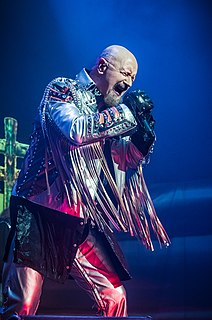A Quote by Elaine Pagels
What is clear is that the Gospel of Judas has joined the other spectacular discoveries that are exploding the myth of a monolithic Christianity and showing how diverse and fascinating the early Christian movement really was.
Related Quotes
The Gospel of Judas really has been a surprise in many ways. For one thing, there's no other text that suggests that Judas Iscariot was an intimate, trusted disciple, one to whom Jesus revealed the secrets of the kingdom, and that conversely, the other disciples were misunderstanding what he meant by the gospel.
There was a time when only specialized Christian missionaries needed to be able to defend the gospel of Jesus Christ against the attacks of Islam. Today every Christian has an opportunity and obligation to present the gospel effectively and in Christian love to the Muslims who have permeated our Western society. When your neighbor, your mechanic, your favorite basketball player, your employer or employee, or even your children's friends could very well be Muslims, the need for proper understanding and an effective Christian witness is abundantly clear.
We are a people of different faiths, but we are one. Which faith conquers the other is not the question; rather, the question is whether Christianity stands or falls.... We tolerate no one in our ranks who attacks the ideas of Christianity... in fact our movement is Christian. We are filled with a desire for Catholics and Protestants to discover one another in the deep distress of our own people.
Our understanding of early Christian beginnings is usually monolithic. It is much determined by the Acts of the Apostles, which pictures a straightforward development from the primitive community in Jerusalem founded on Pentecost to the world-wide mission of Paul climaxing with his arrival in Rome, the political centre of the Greco-Roman world. The Pauline epistles are understood not so much as historical sources reflecting a much more multifaceted early Christian situation fraught with tensions but as theological treatises expounding and defending the doctrine of justification by faith.
Apart from it, the incarnation and the ministry would lose all their significance, the crucifixion would be but a martyrdom, and the cross a symbol of the victory of death over life. By the Resurrection it was that the Crucified One was "declared to be the Son of God with power," the great truth on which the Christian's faith is founded, and to which his hope is anchored. That Christ died for our sins is the Gospel of the Christian religion regarded as a human cult. The Gospel of Christianity goes on to declare "That He rose again the third day according to the Scriptures"







































